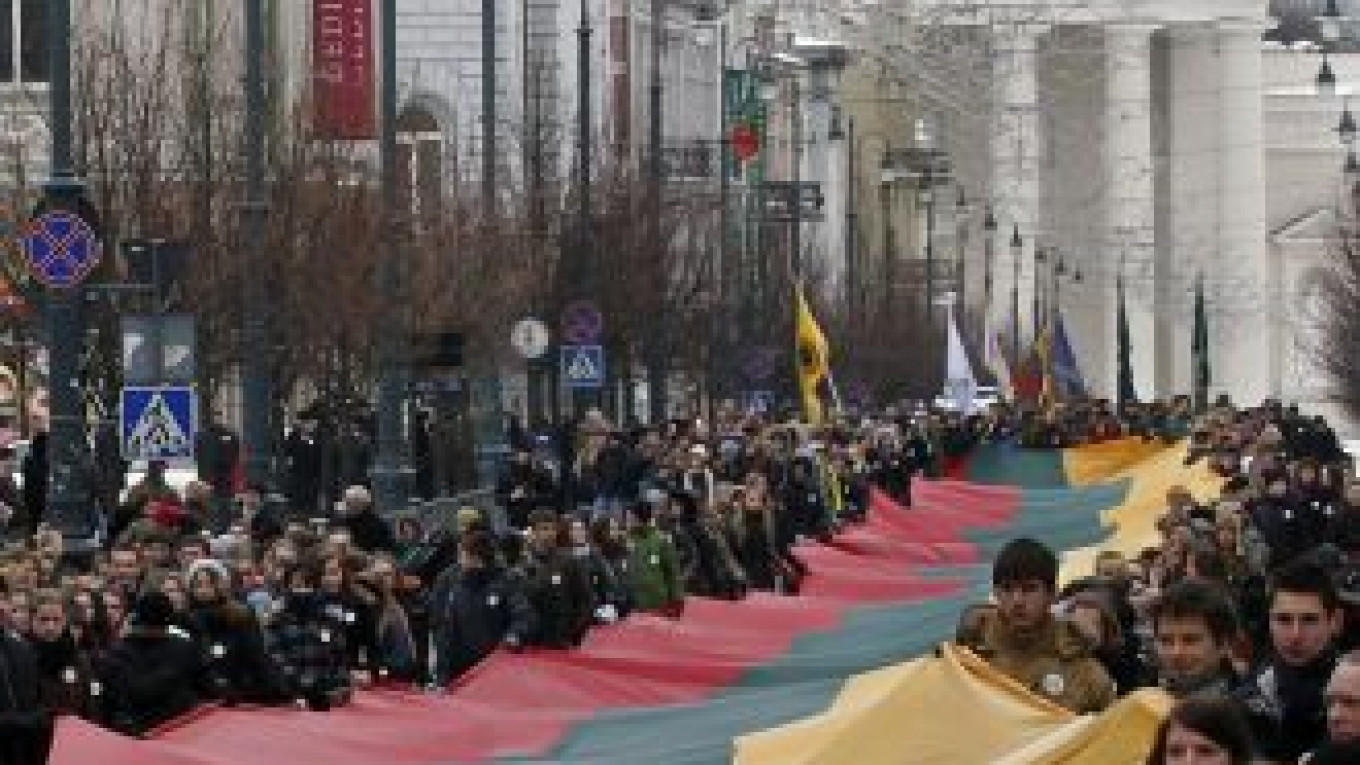MAISIAGALA, Lithuania — Poland and Lithuania are bonded by history, culture and Catholic faith but deeply divided over the letter w.
Used a lot in Polish, the letter doesn't exist in Lithuanian. That and other spelling differences are irritating Lithuania's Polish minority, who demand the right to spell their names in Polish in passports and other documents.
This linguistic row may seem trivial, but in recent months other disagreements have helped escalate it to a full-blown diplomatic standoff. Poland's ambassador was summoned to the Foreign Ministry in Lithuania's capital, Vilnius, and sharp statements have been made by both governments.
In the latest snub, top Polish officials declined invitations to commemorations Thursday honoring the victims of a bloody Soviet crackdown on Lithuania's independence movement 20 years ago.
Since independence in 1991, successive Lithuanian governments have promised to give the country's 200,000 Polish-speakers — representing 6 percent of the population — more freedom to use their native language, but little has happened.
Lithuanian language laws still require passports and street signs to be written in the Lithuanian alphabet, which doesn't have the letters q, w and x and uses diacritical marks on the bottom of letters a, e, i and u.
Resentment is growing in the Polish-speaking east, in rural villages like Maisiagala, whose 2,000 residents celebrate New Year's one hour after the rest of Lithuania to conform with Poland's time zone.
"They should have amended that stupid law a long time ago and let us live in peace. This has gone on for too long," said Stanislawa Monkewicz, 60, a retired teacher. Her name is Stanislava Monkevic in Lithuanian.
Similar disputes are happening elsewhere in Eastern Europe. A Slovak language law limiting the use of Hungarian and other minority languages went into effect Sept. 1, 2009, stoking political tensions between Slovakia and Hungary and garnering criticism from EU authorities.
In Maisiagala, taxi driver Wilhelm Radzewicz, 57, resents being called Vilhelmas Radzevic in his passport. He can't change that, but in protest he put up a street sign on his wooden house in both Lithuanian and Polish. He won't take it down even though he risks a fine of 1,000 litas (about $400).
"I drive my taxi on Vilnius streets every day and see hundreds of [shop] signs in English, German and other languages," he said. "How can they stop me from writing my street name in my native language? This is unfair."
For centuries Poland's territory was located east of its present-day border. After the map of Europe was redrawn following World War II, hundreds of thousands of Poles in 1945 became residents of the Soviet Union — and later of Lithuania, Belarus, Ukraine and Latvia after the Soviet Union collapsed in 1991.
Poland and Lithuania, who once were part of the same kingdom, emerged from the communist era as friendly neighbors, following the same path of Western integration through membership in NATO and the European Union.
But relations started to turn sour in connection with Polish company PKN Orlen's takeover of Lithuania's Mazeikiai oil refinery. Orlen has invested $3.4 billion in the refinery since 2006, but has been plagued by numerous setbacks, including a fire, supply cutoffs, and disputes over rail and port fees.
Polish officials have tried to improve the situation, but their pleas have largely been ignored in Vilnius. Their patience snapped last year and they threatened to sell the refinery to Russia, which would put Lithuania's largest enterprise into the hands of a neighbor it inherently distrusts.
Lithuanians believe that Poland's heightened interest in the Baltic country's Polish minority is linked to tension over the refinery.
On Thursday, when Lithuania celebrated Defenders of Freedom Day, commemorating the 14 people killed and hundreds wounded in a crackdown on pro-independence demonstrators by Soviet tanks and troops, Poland was represented by a presidential aide and the deputy speaker of parliament.
The low-level Polish representation was seen as an insult by Lithuanians, who consider the events on Jan. 13, 1991, a milestone in their struggle against Soviet occupation.
"I think Poland picked the wrong occasion to bring this message," said Rimvydas Valatka, a commentator at Lithuanian daily Lietuvos Rytas. "This date is very important in Lithuanian history."
Virgis Valentinavicius, an adviser to Lithuania's prime minister, said the government tried to amend the language laws to meet the concerns of the Polish minority, but the measure was voted down in parliament. "It will be addressed again," he said.
The spelling feud appeared close to getting solved under former Presidents Lech Kaczynski of Poland and Valdas Adamkus of Lithuania, who were close friends.
"Both said we will be able to write our names with 'w' and other letters. Nothing has changed since then," said Maisiagala alderman Stefan Orszewski — Orsevski in Lithuanian.
In a joint appearance in Maisiagala, the two presidents vowed to address the language dispute. Kaczynski later died in a plane crash in Russia.
City officials are now considering naming a street after him in Vilnius.
The proposed name is "Kacinskio" street, using the Lithuanian spelling.
A Message from The Moscow Times:
Dear readers,
We are facing unprecedented challenges. Russia's Prosecutor General's Office has designated The Moscow Times as an "undesirable" organization, criminalizing our work and putting our staff at risk of prosecution. This follows our earlier unjust labeling as a "foreign agent."
These actions are direct attempts to silence independent journalism in Russia. The authorities claim our work "discredits the decisions of the Russian leadership." We see things differently: we strive to provide accurate, unbiased reporting on Russia.
We, the journalists of The Moscow Times, refuse to be silenced. But to continue our work, we need your help.
Your support, no matter how small, makes a world of difference. If you can, please support us monthly starting from just $2. It's quick to set up, and every contribution makes a significant impact.
By supporting The Moscow Times, you're defending open, independent journalism in the face of repression. Thank you for standing with us.
Remind me later.






